Foreign News
Canada’s Carney makes statement by choosing Europe, not US, for first foreign trip
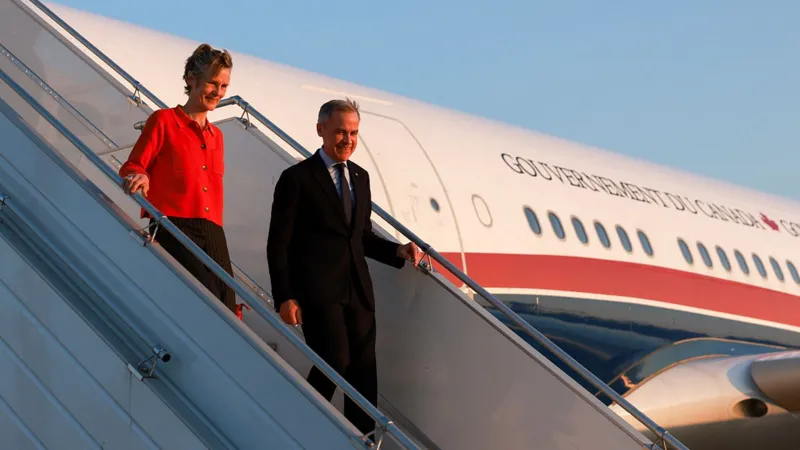
Two European politicians, dressed symbolically in red and white, sent a message last week to Canada on social media declaring “we’ve got your back”.
Also signalling support was King Charles, who planted a red maple tree on the grounds of Buckingham Palace and wore his Canadian medals during a high-profile visit to a naval warship.
Canada’s new Prime Minister Mark Carney has arrived in Paris before heading to London on Monday – a day after his 60th birthday – for his first foreign visit hoping to achieve more than symbolic encouragement. He wants solid support from allies.
Not only is Canada being targeted, like Europe, by a raft of swingeing US tariffs, but Donald Trump is making it clear he wants to take over his northern neighbour.
“We appreciate all the symbolic gestures but we need more public backing,” a Canadian official told me in a voice which underlined the nervous disbelief shared by most Canadians – Trump is not joking when he calls Canada the United States’s “51st state”.
The official messaging from Ottawa about Carney’s trip underlines his priorities – finance and fortifying security – a natural fit for the economist who headed the central banks in both Canada and the UK. A statement from his office said his visit is meant “to strengthen two of our closest and longest-standing economic and security partnerships”.
His itinerary is full of great symbolism too.
Carney revealed it on Friday during his first speech as prime minister when he hearkened back – with a shiny polish – to the origins of this former colony. He hailed “the wonder of a country built on the bedrock of three peoples: indigenous, French and British”.
So there’s a third destination on this whistle-stop tour – Iqaluit, the capital of Canada’s northernmost territory of Nunavut and homeland of its Inuit people. That stop, the statement emphasised, was to “reaffirm Canada’s Arctic security and sovereignty”.
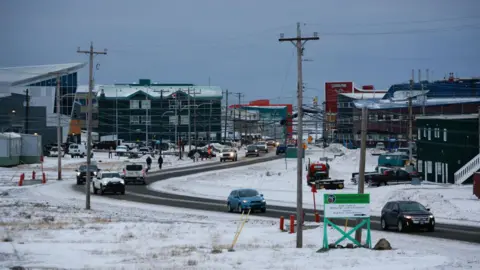
Spectacular Arctic and northern terrain makes up 40% of the land mass of the world’s second largest country. Protecting it is a critical Canadian concern in the midst of intensifying rivalry among world powers in the Arctic region, which has drawn in the US, Russia, China and more; it’s the cold war of all cold wars.
And there’s a personal twist. Carney was born in the small town of Fort Smith in the Northwest Territories, which lies next to Nunavut.
His schedule underlines that he also needs to be a quick study in a new skill – retail politics. A federal election, which has to be held by October, is expected to be called very soon. Carney needs to prove that he can engage with voters, in English and French, as naturally as he does with bankers and finance bosses.
And he needs a proper political mandate. He secured a whopping 86% of the vote when his Liberal Party chose to replace Justin Trudeau, who stepped down as [rime minister amid growing calls to resign from his own party after a decade at the top.
But Carney doesn’t have a seat in parliament; he still doesn’t have the vote of Canadians.
His Liberal party has just experienced a dramatic reversal, a “Trump bump” as well as a Trudeau one. The party which seemed certain to lose, and lose badly, is now tied with its main Conservative rivals in the polls.
Looking like a world leader, and understanding the world of tariffs and trade, is a good look when you are running for high office in the dark shadow of an external threat.
“I think part of the purpose of Mark Carney’s trip to Europe is to show that he can talk internationally to other like-minded powers at this very important moment,” reflects the eminent Canadian historian Margaret MacMillan.
Back home, voters will decide if that is what counts.
Carney is certain to talk Trump tactics, in private, with France’s President Emmanuel Macron and Britain’s Prime Minister Sir Keir Starmer. They’ve both taken great pains to flatter the US president in public, and press their case behind closed doors.
Many will be watching to see how Trump addresses Mark Carney – he recently referred to Canada’s former prime minister as “Governor Trudeau”.
Canada’s new top talker has been talking tough.
A week ago, when Carney won his party’s leadership contest, he invoked Canada’s national sport, ice hockey, which has long been locked in rivalry with US teams. “Canadians are always ready when someone else drops the gloves,” Carney declared to rousing applause.
“Make no mistake, Canada will win.”
But everyone knows this is no game. Carney described this escalating trade war as “the greatest crisis of our lifetime”. More than 80% of Canada’s exports cross the border to the US.
And while there have been a few reports of Canadians flying the US flag, a recent poll by the Angus Reid Institute underlined that a thumping 91% of Canadians reject becoming the 51st state.
On Friday, in Ottawa’s icy cold weather, Carney struck a warmer tone, highlighting how he and Trump share a background in business, including real estate.
“The president is a successful businessperson and dealmaker. We are his largest client in so many industries,” he remarked. “Clients expect respect and working together in a proper commercial way.”
Carney says he “looks forward” to speaking with President Trump. But the fact it will be a call, not a visit, is a measure of this moment. Traditionally, the first foreign visit of a Canadian leader is to the US – its closest neighbour and most trusted partner.
[BBC]
Foreign News
Russian military parade marks 80 years since victory over Nazis

Russia has marked the 80th anniversary of the defeat of Nazi Germany in World War II with a massive military parade on Red Square in Moscow.
Attended by President Vladimir Putin, alongside foreign leaders including Chinese President Xi Jinping and Brazil’s President Luiz Inacio Lula da Silva, the “Victory Day” spectacle, celebrated on May 9, is Russia’s most important secular holiday.
The parade and other ceremonies underline Moscow’s efforts to project its global power and cement the alliances it has forged while seeking a counterbalance to the West amid the conflict in Ukraine that has dragged into a fourth year.
The fight against the Nazis in World War II – known in Russia as the Great Patriotic War – is a rare event in the nation’s divisive history under communist rule that is revered by all political groups. Putin has used that sentiment to encourage national pride and underline Russia’s position as a global power.
The Soviet Union lost 27 million people as it fought Germany’s forces in 1941-45, an enormous sacrifice that left a deep scar in the national psyche.
Speaking at the parade, Putin hailed Russian troops fighting in Ukraine, saying that “we are proud of their courage and determination, their spiritual force that always has brought us victory”.
The event featured at least 11,500 soldiers and more than 180 military vehicles, including tanks, armoured infantry vehicles and artillery used on the battlefield in Ukraine. As a reminder of Russia’s nuclear might, launchers for the Yars nuclear-tipped intercontinental ballistic missiles rolled across Red Square.
Fighter jets from the air force’s aerobatic team flew by in close formation, followed by jets that trailed smoke in the colours of the national flag.
After the show, Putin shook hands with Russian military officers. He also talked to a group of medal-bedecked senior North Korean officers who watched the parade, hugging one of them.
Last month, Putin thanked North Korea for fighting alongside Russian troops against Ukrainian forces and hailed their sacrifices as Pyongyang confirmed their deployment for the first time.
Putin had declared a unilateral 72-hour ceasefire starting on May 8 to coincide with the Victory Day celebration, but warned that Russian troops would retaliate to any attacks.
The events were overshadowed by Ukrainian drone attacks targeting Moscow and severe disruptions at the capital’s airports.
Russian flag carrier Aeroflot on Wednesday morning cancelled more than 100 flights to and from Moscow, and delayed at least 140 others as the military repelled repeated Ukrainian drone attacks on the capital.
Russian authorities tightened security ahead of the parade and mobile phone internet outages were reported amid electronic countermeasures aimed at foiling further drone attacks.
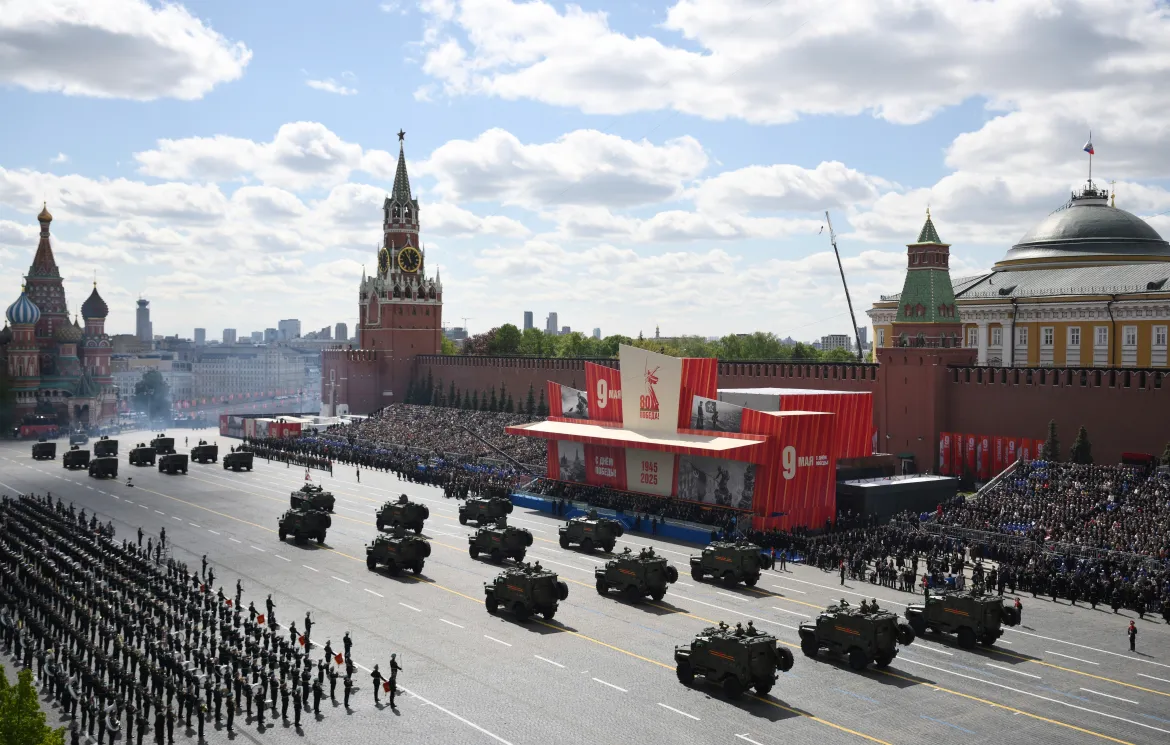
Military vehicles roll into Red Square during the parade.[Aljazeera]

Russian Defence Minister Andrei Belousov is driven along Red Square in an Aurus car [Aljazeera]
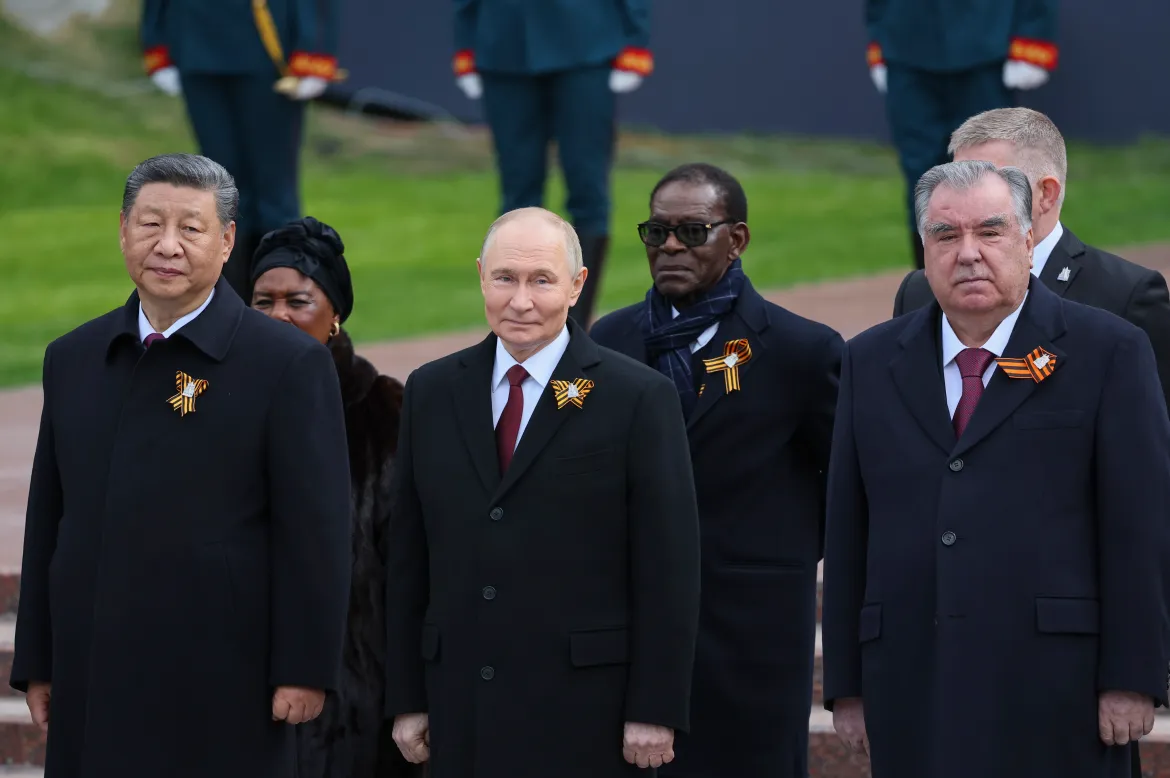





[Alljazeera]
Foreign News
Mexico sues Google over ‘Gulf of America’ name change
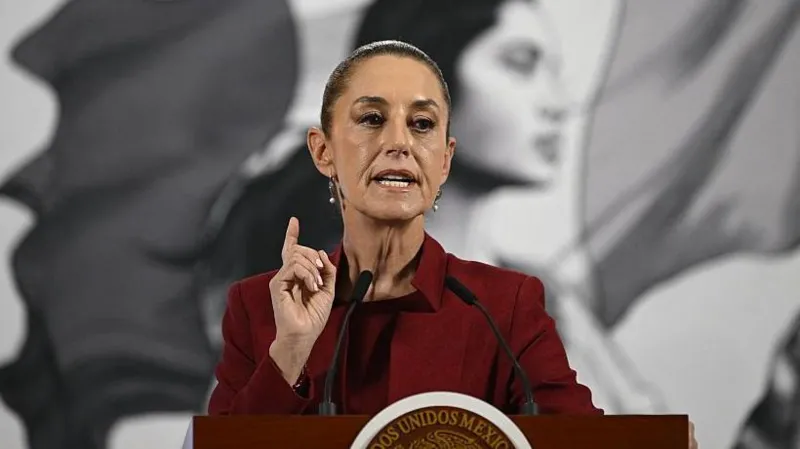
Mexico is suing Google for ignoring repeated requests not to call the Gulf of Mexico the Gulf of America on Google Maps for US users, President Claudia Sheinbaum says.
She did not say where the lawsuit had been filed. Google did not respond to the BBC’s request for comment.
On Thursday, the Republican-led House of Representatives voted to officially rename the Gulf for federal agencies.
President Donald Trump signed an executive order on his first day in office in January.
He argued the change was justified because the US “do most of the work there, and it’s ours”.
However Sheinbaum’s government contends that Trump’s order applies only to the US portion of the continental shelf.
“All we want is for the decree issued by the US government to be complied with,” she said, asserting that the US lacks the authority to rename the entire gulf.
In January, Sheinbaum wrote a letter to Google asking the firm to reconsider its decision to rename the Gulf of Mexico for US users. The following month, she threatened legal action.
At the time, Google said it made the change as part of “a longstanding practice” of following name changes when updated by official government sources.
It said the Gulf – which is bordered by the US, Cuba and Mexico – would not be changed for people using the app in Mexico, and users elsewhere in the world will see the label: “Gulf of Mexico (Gulf of America)”.
The Associated Press (AP) news agency’s refusal to start referring to the Gulf of America led to a months-long conflict with the White House, which restricted AP’s access to certain events.
A federal judge ordered the White House in April to stop sidelining the outlet.
Trump hinted Wednesday that he may recommend changing the way the US refers to another body of water.
During an upcoming visit to Saudi Arabia, he plans to announce that the US will henceforth refer to the Persian Gulf as the Arabian Gulf or the Gulf of Arabia, AP reported.
Iranian Foreign Minister Abbas Araqchi has responded by saying he hopes the “absurd rumours” are “no more than a disinformation campaign” and such a move would “bring the wrath of all Iranians”.
[BBC]
Foreign News
Pope Leo XIV calls Church ‘a beacon to illuminate dark nights’ in first Mass

The new Pope, Leo XIV, has called in his first Mass at the Vatican for the Catholic Church to “desperately” counter a lack of faith.
Speaking the day after he was elected as the 267th Pope and first US leader of the Church, he warned that people were turning away from faith and instead to “technology, money, success, power, or pleasure”.
Leo said he had been elected to be a “faithful administrator” of a Church that would act as a “beacon that illuminates the dark nights of this world”.
The ascension of Robert Francis Prevost has been celebrated by the world’s 1.4 billion Catholics, with joyous outbursts in his US homeland and in Peru, where he served for 20 years.
In his sermon on Friday, the new Pope said there were many settings where the Christian faith was considered “absurd” – with power, wealth, and technology dominating – but it was precisely there that missionary outreach was needed.
“A lack of faith is often tragically accompanied by the loss of meaning in life, the neglect of mercy, appalling violations of human dignity, the crisis of the family and so many other wounds that afflict our society,” he said in the address delivered in Italian.
Pope Leo, 69, wore a white papal robe trimmed in gold as he addressed the seated cardinals in the Sistine Chapel, an event broadcast live by the Vatican administration.
In an unscripted introduction before the homily, Leo also called on Church unity from his cardinals, telling them in American-accented English: “I know I can rely on each and every one of you to walk with me”.
Following weeks of anticipation, the previously-unknown Prevost was introduced as the new Pope to the world on Thursday evening in St Peter’s Square.
Tens of thousands of worshippers in the square burst into cheers when white smoke curled out of the Vatican’s chimney on the second day of the conclave’s voting.
Shortly after, the Chicago-born Prevost appeared on the balcony of St Peter’s Basilica. In his first words to the crowds he outlined a vision of a “missionary” Church which “builds bridges, which holds dialogues, which is always open”.
He echoed his predecessor, the late Pope Francis, in calling for peace.
“Help us, and each other, to build bridges through dialogue, through encounter, to come together as one people, always in peace,” he said.
World leaders have rushed to congratulate Prevost on his election, pledging to work with him on global issues amid uncertain times. US President Donald Trump called it a “great honour” to have the first American pope.
Prevost, who had previously been the Bishop of Chiclayo in Peru, was only made an archbishop and then cardinal in 2023. He was elected by his fellow cardinals in what is believed to be four rounds of voting in the secret conclave that took place two weeks after Francis died.
He is seen as being aligned with the progressive late Pope, who was viewed as a champion of human rights and the poor and celebrated for his charismatic style that sought to make the Catholic Church more outward-facing.
Vatican watchers have noted that Francis appeared to have brought Prevost to Rome in recent years, perhaps to set him up as a potential successor.
The Augustinian missionary worked for decades with the poor and marginalised in Peru, where he obtained nationality in 2015.
In his previous role as Cardinal Prevost, he had also expressed or amplified criticism of the US administration under President Trump, including its anti-immigration policies.
On an X account under his name, he had criticised Vice President JD Vance in February. Vance, who is a Catholic convert, had said Christians should love their family, neighbours, community and fellow citizens in that order. Prevost had written: “JD Vance is wrong: Jesus doesn’t ask us to rank our love for others”.
As Pope now, he faces a momentous task in leading the Church in a time of significant global conflicts. Observers have expressed hope that he can offer a counterpoint to more divisive voices on the world stage.
His next appearances, at Sunday’s midday Regina Coeli prayer in St Peter’s Basilica and a Monday news conference with journalists, will be closely watched for signs as to which direction he intends to lead the Church and what kind of Pope he will be.
[BBC]
-

 Opinion6 days ago
Opinion6 days agoRemembering Dr. Samuel Mathew: A Heart that Healed Countless Lives
-

 Business4 days ago
Business4 days agoAitken Spence Travels continues its leadership as the only Travelife-Certified DMC in Sri Lanka
-

 Latest News3 days ago
Latest News3 days agoNPP win Maharagama Urban Council
-

 Business4 days ago
Business4 days agoLinearSix and InsureMO® expand partnership
-

 Business2 days ago
Business2 days agoJohn Keells Properties and MullenLowe unveil “Minutes Away”
-

 Features6 days ago
Features6 days agoTrump’s economic missiles are boomeranging
-

 Latest News6 days ago
Latest News6 days agoThe Heat index is likely to increase up to ‘Caution level’ at some places in Eastern, Northern, North-central and North-western provinces and in Monaragala and Hambantota districts.
-

 Business3 days ago
Business3 days agoNDB Bank partners with Bishop’s College to launch NDB Pixel awareness












